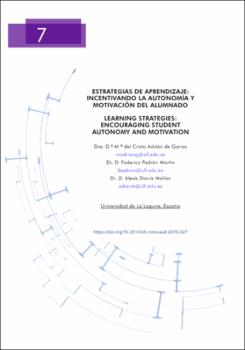Estrategias de aprendizaje: incentivando la autonomía y motivación del alumnado
Date
2019Abstract
Aprendizaje del alumnado. La Autonomía, es decir, el alumno tendrá la libertad
para preguntar, analizar, innovar, considerar nuevas situaciones y buscar alternativas,
y la Motivación, donde desarrolla una actitud adecuada para aprender y activar las
conductas necesarias para alcanzar el objetivo marcado en el proceso de enseñanza
y aprendizaje, descubriendo progresivamente algo que le interesa. Se estructura
en cuatro apartados, en primer lugar, una pequeña introducción donde nos acerca
hacia la autonomía del alumno desde otro punto de vista. En segundo lugar los objetivos,
destacando principalmente la aplicación de las estrategias de aprendizaje,
basándonos en la autonomía y por supuesto la motivación. En tercer lugar la metodología
utilizada que en nuestro caso se hace uso de la asignatura de tercer grado
en tecnología «Motores de Combustión interna» de la EPSIS Náutica, Máquinas y
Radioelectrónica Naval, con un número total de 50 alumnos. Y por cuarto lugar, los
resultados, utilizando el aula virtual de la asignatura, se han realizado una serie de
tareas en la que el alumnado el cual está completamente familiarizado con ella, y
así facilitar la autonomía en cuanto a la búsqueda de información, etc. This work aims to capture two very well defined objectives in the Learning Strategies
of students. The Autonomy, that is, the student will have the freedom to ask, analyze,
innovate, consider new situations and look for alternatives, and Motivation, where
he develops an appropriate attitude to learn and activate the necessary behaviors to
reach the goal set in the process of teaching and learning, discovering progressively
something that interests you. It is structured in four sections, first, a small introduction
where we approach the autonomy of the student from another point of view. Second,
the objectives, highlighting mainly the application of learning strategies, based on
autonomy and of course motivation. In third place the methodology used that in our
case makes use of the subject of third degree in technology «Internal combustion
engines» of the Nautical EPSIS, Machines and Naval Radioelectronics, with a total
number of 50 students. And for fourth place, the results, using the virtual classroom
of the subject, have been carried out a series of tasks in which the students are
completely familiar with it, and thus facilitate the autonomy in terms






